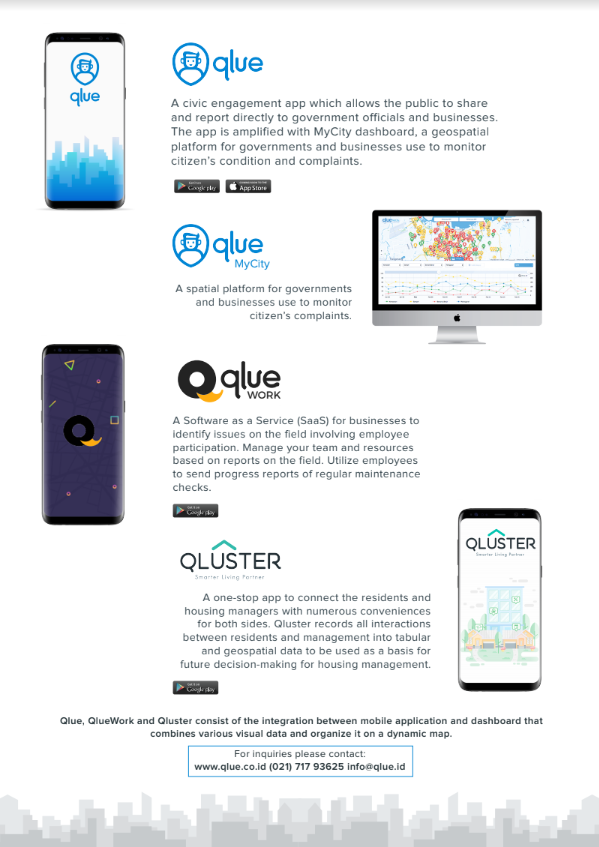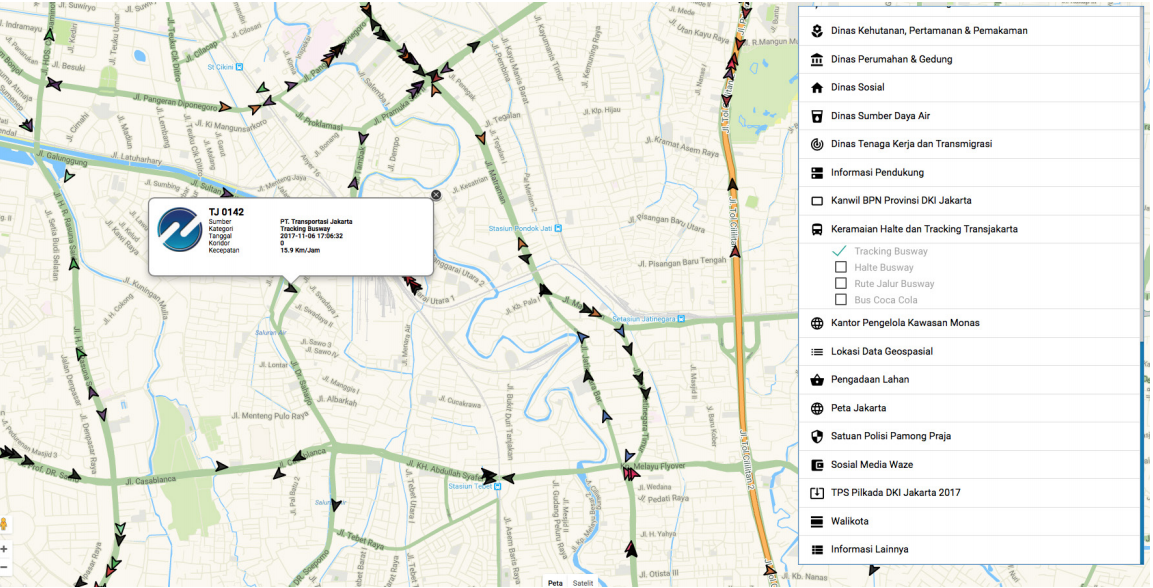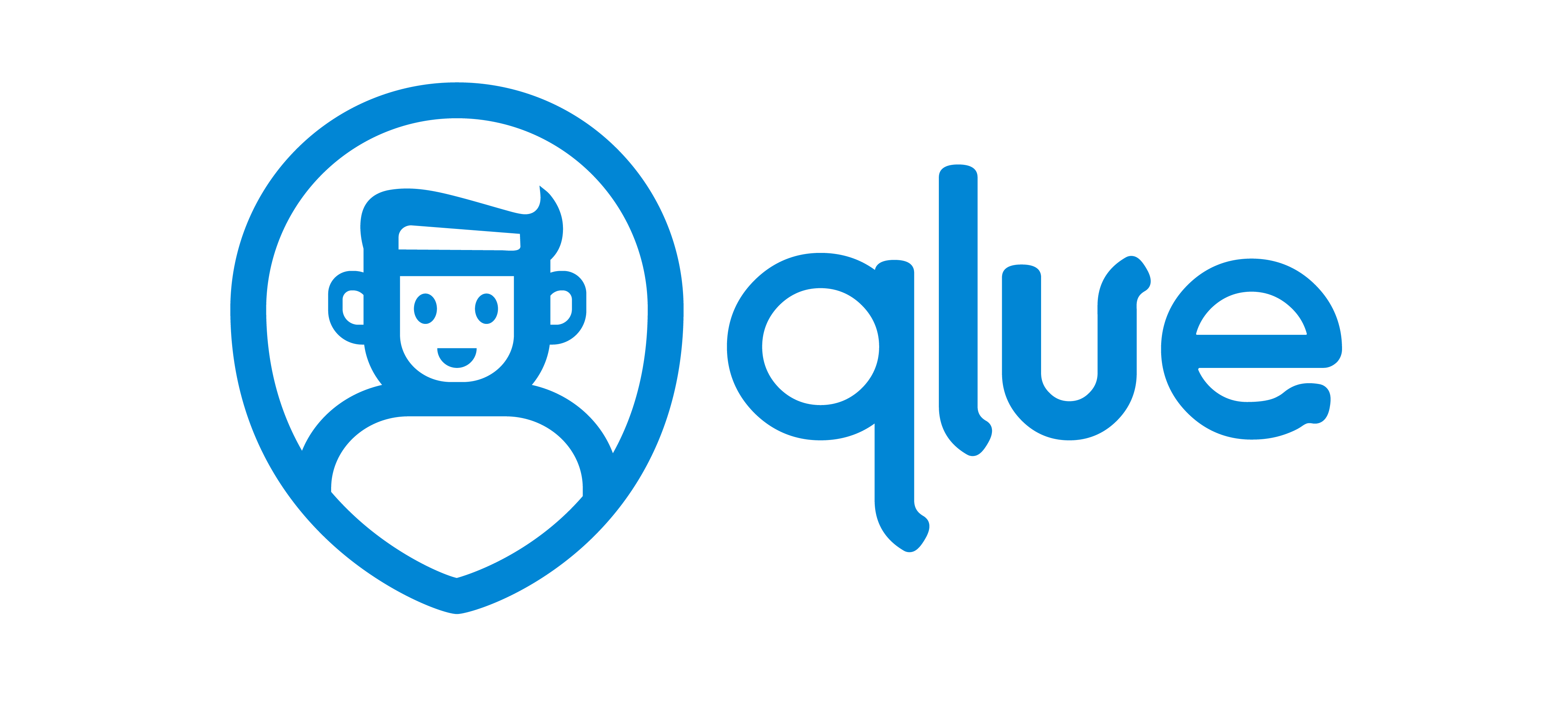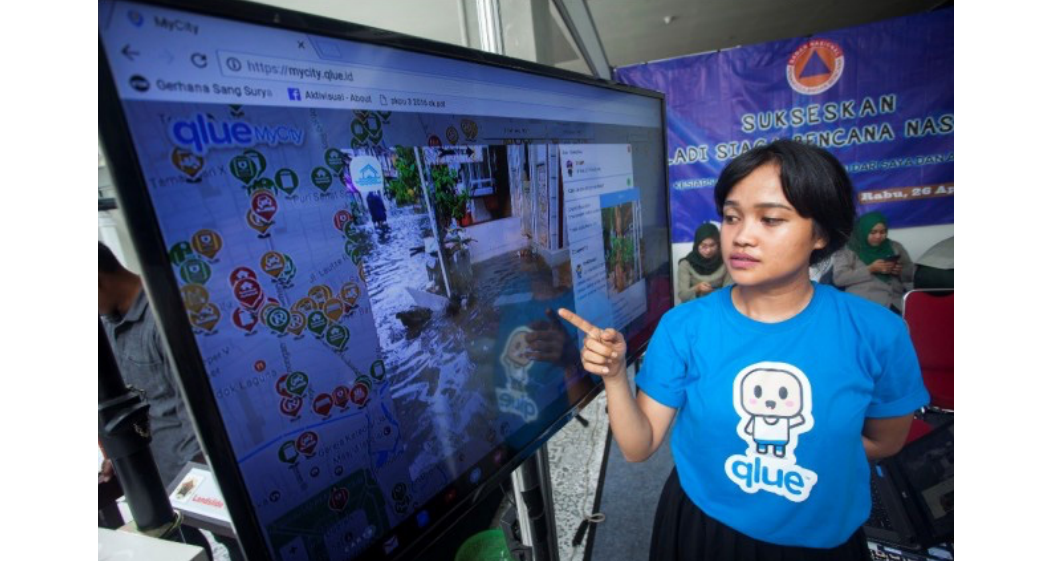
Qlue Smart City Participation System
- WEGO |
- Smart Sustainable City Projects Catalog
Jakarta
To establish communication with this city regarding their project, please contact secretariat@we-gov.org
-
Fast Facts
City :
$300,000
Budget
2014
Implemented Year
10,000,000
Population
Region : Asia
National GDP Per Capita (USD) : 3,789 (IMF, 2018)
City Population: 10,075,310
Year Implemented : 2014
National Gini Index : 39.5 (World Bank, 2013)
Tags : GOVERNANCE CITIZEN PARTICIPATION
Technologies Utilized : GIS Mapping Dashboard, location-based mobile apps, React Native
Funding Source : Greater Jakarta
Project Cost : $300,000 (platform development and licensing)
Project Savings : NA
Planned Project Duration : 3 years pilot, extended additional 3 years
KPIs : District officer performance evaluations, registered users, citizen satisfaction rate, response time for requests
-
Project Context and Overview
Jakarta is a diverse city of over 10 million citizens; the Greater Jakarta metropolitan area, has over 30 million citizens. The ever-growing metropolis has made management and provision of city and civil services challenging. In addition, high profile failures such as costly transportation projects, poor and complicated administrative services, and a perceived lack of transparency in communications with citizens have led to an erosion of citizen confidence in public service.
However, the country is among the world’s leaders in social media usage by volume, with a thriving, politically-active community of citizens expressing opinions via platforms such as Twitter. Reflecting the broader national initiative of Nawa Cita, a nine pillar program to modernize Indonesia, Qlue Smart City was launched by the former governor of Jakarta, Mr. Basuki (Ahok) Tjahaja Purnama. Qlue is a platform that is able to capture data from various sources and aggregate them. Data is managed through a GIS-based dashboard that can be overlaid with other city data to generate multiple combinations of insights to help address specific city problems.
It was launched in in 2014 in order to capitalize on the eagerness of Jakarta’s citizens to engage via mobile apps. This project aimed to address three main issues: public service transformation (through improved complaint-handling mechanism and administration), data collection and management, as well as increasing citizen participation in Greater Jakarta.
As a performance indicator, Qlue collaborates with the Bureaucratic Reform Agency to conduct monthly district officer performance evaluations based upon their effectiveness in adequately taking into account and responding to citizen concerns submitted via the platform. -
Project Planning and Implementation
The solution was developed by the locally-based tech company, Qlue, and the project was carried out in cooperation with various organizations, private entities, and multiple municipal officials to ensure synergy between stakeholders and a sustainable project, post-implementation.
The project began in the midst of an open data initiative by Jakarta, for which Qlue was contracted as the GIS mapping platform provider. Qlue’s role expanded after they proposed additional tools to augment data collection, which had been insufficient in the past. Their proposed addition to the program included crowdsourcing reports from citizens that officials from Jakarta could verify and act upon in real-time. Citizens report issues via mobile apps available for both iOS and Android, and city officials monitor and address these reports through a Command Center which utilizes a GIS Mapping Dashboard. Qlue relies heavily on data integration as a key component and uses the React Native framework consequently. The platform supports many data types, including but not limited to JSON, GeoJSON, SHP/DWG, XML/KML.
Jakarta funded the project for a total of $300,000 to develop and license the map-based platform. The initial pilot of the program operated from 2014-2017 and was granted a three-year extension based upon its success and will run until 2020. Not included in this budget however, is the additional staff salaries for the newly-created response unit which handles citizen submissions via the platform.
Certain legislative measures needed to be taken in order for the project to be fully implemented, and while these were done by gubernatorial decree, current efforts are underway to pass national laws which would make such measures possible throughout Indonesia. They include the modification of responsibilities of the local community and district-level leaders, new rules and instructions on public reporting and complaint handling, and the creation of dedicated task forces such as the Jakarta Smart City organization and PPSU (field workers that serve as a rapid response complaint handlers).
Qlue trains Jakarta staff and transfers technological capabilities to them, but as some of the technology requires very specialized expertise, Jakarta Smart City hired 5 civil officials and 40 other professionals from the private sector. The city also still enjoys support from Qlue which has a team of 70 that handles city clients. Some examples of relevant skills include mobile app development, GIS mapping, and data engineering. -
Project Results
By a variety of measures, the program has been considered a success, enough so to extend and expand upon the project past its initial three-year trial. The system has 500,000 registered users, of which 4,000 are active daily. 91% of citizens claim satisfaction with the system, while 61% of survey respondents found it effective in solving problems. According to data collected by Qlue, response rate for concerns raised by citizens via Qlue Smart City averaged to 13 days, but also ranged from 2-3 hours for some complaints such as waste removal to much longer for infrastructure repairs.
While the district officer performance evaluations are output reflective of individual performance and not the performance of the project itself, the project has increased performance measureability for public officials and held them more accountable for their work. While citizen confidence in government is hard to quantify regarding this, it is possible that it is reflected in the system satisfaction rate.
Qlue has also been recognized globally as it was awarded Best Mobility Project by the World Smart City Organization in 2018 and Best Mobile Governance Applications on Public Empowerment Category at the World Government Summit in 2019. -
Recommendations for Transfer
Cities with smart city ambitions, where citizens are particularly active on social media could be strong candidates for such a system. In places where legislative basis for components of such a system are not in place, it would be necessary to pass such legislation as Jakarta did.
A major challenge to success was the stubbornness of bureaucrats to comply with a program under which they would face greater public scrutiny and accountability. A top-down approach from the governor to push the program on reluctant officials was necessary, though some concerns might be raised about the sustainability of such a project once the administration changes. In Jakarta’s case, public popularity has ensured its survival, and it has thrived even under a new administration. Public education and promotional campaigns for the project helped to secure this support. Promotion was based on issues such as the eradication of child violence and exploitation, which were likely to resonate with citizens. To gain the widest public acceptance and participation, of course the project itself should be well-executed. -
Figures and Images

-
External links




